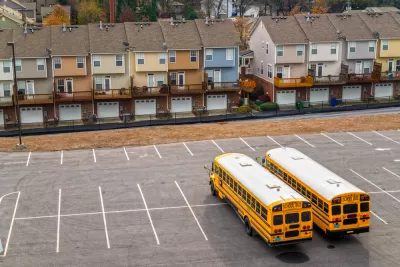Richard Florida cites new research to argue that car culture and car oriented communities are the main culprits in the unhealthy lifestyles of U.S. school children.

"Long commutes to school have negative impacts on children’s well-being, especially on sleep and exercise," writes Richard Florida, broadcasting news about a new study by researchers at Cal Poly, Rutgers University, and UCLA, published by the Journal of Planning Education and Research.
The study "takes a detailed look at how lengthy commutes affect the time kids devote to other daily activities," by analyzing "more than 2,700 high-school students’ responses from the American Time Use Survey (ATUS) conducted by the Bureau of Labor Statistics, spanning from 2003 to 2015."
There is good news to be found in the study's findings, according to Florida. The average commute was short (a8 minutes), and the most common commute was even shorter (five minutes and 10 minutes).
There is also bad news. There are a small number of students who commute more than an hour, which take a "substantial toll" on the exercise and sleep on those students. "Each additional minute of commuting is associated with an even greater 1.3-minute reduction in sleep," explains Florida. "To put that in perspective, if one student had a 10-minute commute, and a second had a 30- minute commute, the second student would get an average of 26 minutes less sleep."
Longer commutes take an even larger toll on exercise, as explained in the source article.
Florida's big point, however, is about how sprawling land use patterns force long commutes on many students, and given a shortage of realistic solutions to that problem in the near term, schools will have to take specific, effective action in shortening commute times for students.
FULL STORY: Long School Commutes Are Terrible for Kids

Rethinking Redlining
For decades we have blamed 100-year-old maps for the patterns of spatial racial inequity that persist in American cities today. An esteemed researcher says: we’ve got it all wrong.

Montreal Mall to Become 6,000 Housing Units
Place Versailles will be transformed into a mixed-use complex over the next 25 years.

Planetizen Federal Action Tracker
A weekly monitor of how Trump’s orders and actions are impacting planners and planning in America.

Connecting Communities to Nature Close to Home
Los Angeles County’s Nature in Your Neighborhood program brings free, family-friendly wellness and nature activities to local parks, making it easier for residents to enjoy and connect with the outdoors.

Palmdale’s Beloved Water Park Gets $2 Million Upgrade
To mark its 20th anniversary, DryTown Water Park has undergone major renovations, ensuring that families across the Antelope Valley continue to enjoy safe, affordable, and much-needed water-based recreation in the high desert.

Help Stop the Beetle Killing Southern California’s Oak Trees
Claifornia residents can join a volunteer “blitz” this June to help detect and map infestations of an invasive beetle that is killing thousands of oak trees across Southern California.
Urban Design for Planners 1: Software Tools
This six-course series explores essential urban design concepts using open source software and equips planners with the tools they need to participate fully in the urban design process.
Planning for Universal Design
Learn the tools for implementing Universal Design in planning regulations.
Heyer Gruel & Associates PA
City of Clovis
City of Camden Redevelopment Agency
City of Astoria
Transportation Research & Education Center (TREC) at Portland State University
Regional Transportation Commission of Southern Nevada
Toledo-Lucas County Plan Commissions





























